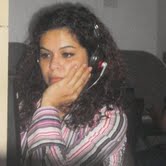When Suzette Jordan feels like giving up on life, she thinks of her two teenage daughters. It's enough to jolt her out of the despair and hopelessness that suffocates her when circumstances get too overwhelming.
It's been over a year and six months since her ordeal. Early in February 2012, she was gang-raped in a moving car, on Kolkata's Park Street. She was viciously assaulted and then thrown on the road in the dead of the night. If that wasn't horrific enough, what followed that life-altering incident left her even more terrified. Her dignity was stripped layer by layer - right from the time she resolved to file a case against her attackers. She faced unrelenting harassment and ridicule, ugly accusations about her integrity and heaps of appalling abuse. The secondary trauma of rape played on every single day.
Jordan was dubbed the 'Park Street Rape Victim' by the media; as a victim of sexual violence, her identity was kept hidden. Exhausted by constantly living in fear and outraged by the injustice of it all, she bravely stepped out of the shadows recently. Of the five men who attacked her, only three of the accused were arrested - Ruman Khan, Nasser Khan and Sumit Bajaj. The main accused, Kader Khan and another accused Ali Khan are still at large. "I will live in dread till they are caught, but if justice is served that is one wound less," she says.
Though the road to recovery is a long and tortuous one, fraught with recurring moments of despondency, Jordan says that she is working toward finding herself again, that she is a survivor and that her fight for justice for all women is far from over. Excerpts of her conversation with Vinita Shetty:
International standards for rehabilitation for victims of sexual violence mandate government-provided legal aid, free long-term therapy, adequate compensation, employment facilitation and financial support - have you been offered any of these resources?
The government is fighting my case. But it has has done nothing in terms of rehabilitation. I go to court and I stand there alone, facing the questioning, the probing. I had no counsellor with me when they conducted the medical examination; I have no counsellor today when I am in court, facing my attackers. I know I need that kind of emotional support, that I need therapy. I know it will help me.

When you are financially independent you have a sense of confidence when you are depressed, undergoing trauma, depending on friends for everything, and completely uncertain of the future, it breaks you. You need at least one part of your life to be under control.
How harshly has life changed after the incident?
I'm unable to cope, but I have to; I have no choice. My mind is constricted with so much that I have no time for myself. I am hurting . I need help, I wake up at night screaming, I have panic attacks, I go into rages. I was supposed to begin therapy that was offered by an NGO but I have been running around all on my own for the case, to arrange funds, to get a job. Where is the time? Who is going to help me put my life back on track? I need work, I need to pay my bills, and I have to run a home. Life has not changed for me alone; it's changed for my family, my children and my loved ones.
Even now when I am alone at night, I have suicidal thoughts. What stops me is that I know my children need me - I know I can't cross this lakshman rekha. I have been through every kind of torture imaginable during and after the incident and I know things will never be normal again. I've become paranoid about everything . about the doorbell ringing, my children getting delayed at school, someone staring at me, walking in the park, being discriminated against . it's harrowing. I'm always scared. My children are scared.
Even if a victim wants to move on, society and the system do not support her enough. What disheartens you most about a victim being treated unfairly?
I've fought for my rights all my life. As a single parent I am the father and mother to my children. I'm trying to move forward. But I am often demoralised by the whole system. I've been accused of fabricating the incident, I've been questioned about my motives. I was branded a bad parent, called a prostitute, people said that this was a deal gone bad, that this was orchestrated to bring down the government. My ethics and integrity have been attacked ruthlessly. The versions about the incident tear me to bits; the worst is when people say that all this is for money.
What is perhaps most distressing is that just as we begin to see some hope for the system, it fades away quickly. The recent amendments recommended for quicker trial and enhanced punishment for rape are not being followed. The rehabilitation process for a victim has to begin while information gathering takes place, not just after the judgment is passed. As long as wrongdoers get away by justifying their actions, blame the woman and her parents, try to corrupt justice in every possible way, there can never be any change - laws implemented only on paper will never help women.
What keeps me going is the positive energy from some sections of society, from those who care . that kind of solidarity has been so good for me.
What has the financial burden of this incident been? I mean, bills have to be paid, non-working days accounted for, and food has to be put on the table...
After the incident in February 2012, I was at home for a few months, recovering physically. In May that year I started looking for a job desperately, but it was impossible to get one. I was ostracised like I had a disease, looked down upon, judged at all times. Before I revealed my identity it was much worse; now that I have, it's not that bad because people know everything about me. Yet, no one wants to hire me.
It is hurtful and it adds to the depression you are going through. It's like being punished all over again - you are in a coffin, you are alive and they are burying you. When my identity was not revealed, people would put two and two together and then politely tell me that they would get back to me. No one told me outright that they did not want to give me a job. My children's fees had to be paid, daily expenses had to be covered. It was, and continued to be, a downward spiral.
Have things gotten any better?
Some support has come through NGOs, from community organizations. The NGO Swayam backed me and my family and close friends gave me strength. Social activist Santasree Chaudhuri gave me a job at a helpline she had started - Survivors for Victims of Social Injustice. I thought it would be therapeutic and that I could help them in my own little way.
All went well till a young girl from Kamduni was abducted, gang-raped and murdered. When I went to the village and spoke to her family, I don't know what happened I broke down . I cried for three days. I could not take it anymore. I was losing my sanity. I had worked for three months, but then I had to leave the job in July. I realized that unless I was whole, I could not help others. Maybe I jumped in too soon and maybe I was trying to heal others before healing myself.
I'm at home now because of the court case and I need to focus on that. My community . the Calcutta Anglo-Indian Service Society (CAISS) - has reached out to me. They are helping to get my daughters' lives back to normal and I am thankful to them. My children have suffered a lot. I had no money to pay my daughters' fees last year. Luckily they did not lose a year of school as I spoke to the principal and the owner, and they gave me a waiver. I still have to pay it up once I get a job.
Apart from the much-needed monetary assistance, is there anything else that financial empowerment or a job brings to a rape victim who is trying to get back on her feet?
When you are financially independent you have a sense of confidence; when you are depressed, undergoing trauma, depending on friends for everything, and completely uncertain of the future, it breaks you. The little confidence you have evaporates and it shuts you down like a bad computer. There's no fresh blood in your veins. You need at least one part of your life to be under control so that you do not think of the incident all the time.
When you are working, the demons in your mind are fewer, you know your rent is being paid, you know you have something set aside for medical emergencies, for your children. Yes, I want a job; I need one to sustain myself and my family. I would love to get back to a work environment with colleagues, regular working hours and a sense of purpose. I want to give my daughters a good education and I need to be able to give them security. I am keen to work with children in an environment which gives me energy - something creative and stress-free.
What do you miss the most about your life before the incident?
I miss just being a normal person - taking my children out, walking in the park, meeting my friends, going out and dressing up. I will never do any of that that without looking over my shoulder.
I've become paranoid about my children, too. They have been strong through it all, but they are so young and the emotional burden is huge. They are my strength and they support me selflessly but because of what happened I have become very strict with them. If they are five minutes late coming back from school or anywhere else, I start panicking and yelling. Even if they are caught in the rain, I go crazy. If I can't contact them, I am terrified and imagine the worst.
I never felt this kind of panic all my life. I was a confident and self-assured person; now I'm over-anxious and fragile. I barely get to sleep; I am short tempered and agitated. I miss the old me.
I need closure . not just in terms of the court case, but in so many ways. If and when they are convicted, I will feel a sense of finality. Two of them are still
at large and the thought of them being out there is very scary. There's a big part of me which died that night, nothing can bring her back. But I can't give up
the fight and I won't . I owe it to myself and to all survivors who are fighting for justice.

























